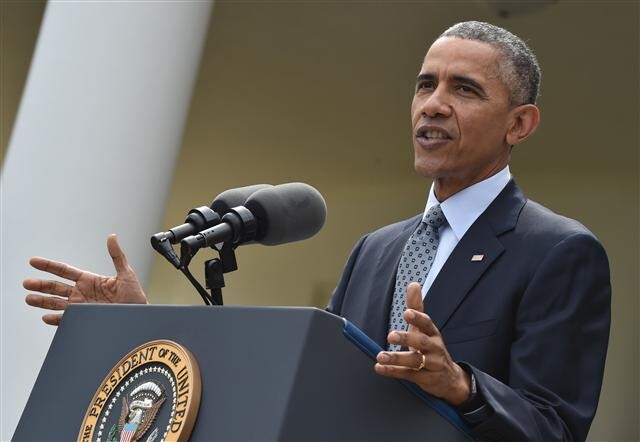hankyoreh
Links to other country sites 다른 나라 사이트 링크
[Editorial] The Iran deal and the need to solve the N. Korean nuclear issue

The North Korean nuclear issue is drawing international attention in the wake of the recent historic nuclear deal with Iran. After those negotiations ended, the US State Department stressed that Iran and North Korea were very different issues - but the very fact that a connection between the Iran and North Korean nuclear issues is the subject of open questions and answers offers a clear sign of them being co-related.
Obviously, the two are fundamentally different in two regards. The biggest difference is that Iran has not developed any nuclear weapons yet, whereas North Korea‘s three nuclear tests to date suggest it has some level of nuclear armament. Also, while Iran has a relatively open society where crude oil export restrictions and other economic sanctions from outside can have a major effect, North Korea is a closed economy that is little affected by external sanctions.
Still, the fact that a diplomatic solution could be reached on a difficult nuclear issue by demonstrating some give-and-take offers a big lesson for the negotiations on the North Korean program, which have yet to break out of their stalemate in the six years since the last six-party talks in December 2008. It does present something of a hurdle that North Korea is believed to already have nuclear weapons, but it’s not as though the objections from US allies Israel and Saudi Arabia were any less intense with the Iran talks.
The problem is that a commitment to negotiate is key, and the US doesn’t seem to be as committed to or interested in the North Korean nuclear issue as it was with its talks with Iran. As remarks from State Department spokesperson Marie Harf show, Washington is still insisting on a genuine and credible commitment to total denuclearization from Pyongyang as a requirement for resuming the talks. Under the circumstances, we are unlikely to see any momentum from the US for now in terms of solving the nuclear issue, or getting dialogue back on track so the issue can be solved.
In that sense, it’s more important than ever to see an effort from South Korea, which bears the brunt of problems from the North Korean nuclear issue. The matter of a Terminal High Altitude Area Defense (THAAD) deployment, which currently has Seoul wedged in an uncomfortable position between Washington and Beijing, could easily be circumvented if tensions with Pyongyang were defused.
So the attitude out of Seoul since the Iran agreement has been disappointing to say the least. There isn’t any sign of commitment or movement to leverage that agreement into momentum for resolving the North Korean nuclear issue. With that kind of attitude, Seoul is going to have a tough time getting very much out of the “exploratory dialogues” that have had it traveling to the US, China, Japan, and Russia since last month in search of a way back into the six-party talks. It needs to be ready to say, “Nobody but us can do this,” and do what it takes to get the nuclear issue solved.
Please direct questions or comments to [english@hani.co.kr]

Editorial・opinion
![[Column] Park Geun-hye déjà vu in Yoon Suk-yeol [Column] Park Geun-hye déjà vu in Yoon Suk-yeol](https://flexible.img.hani.co.kr/flexible/normal/500/300/imgdb/original/2024/0424/651713945113788.jpg) [Column] Park Geun-hye déjà vu in Yoon Suk-yeol
[Column] Park Geun-hye déjà vu in Yoon Suk-yeol![[Editorial] New weight of N. Korea’s nuclear threats makes dialogue all the more urgent [Editorial] New weight of N. Korea’s nuclear threats makes dialogue all the more urgent](https://flexible.img.hani.co.kr/flexible/normal/500/300/imgdb/original/2024/0424/7317139454662664.jpg) [Editorial] New weight of N. Korea’s nuclear threats makes dialogue all the more urgent
[Editorial] New weight of N. Korea’s nuclear threats makes dialogue all the more urgent- [Guest essay] The real reason Korea’s new right wants to dub Rhee a founding father
- [Column] ‘Choson’: Is it time we start referring to N. Korea in its own terms?
- [Editorial] Japan’s rewriting of history with Korea has gone too far
- [Column] The president’s questionable capacity for dialogue
- [Column] Are chaebol firms just pizza pies for families to divvy up as they please?
- [Column] Has Korea, too, crossed the Rubicon on China?
- [Correspondent’s column] In Japan’s alliance with US, echoes of its past alliances with UK
- [Editorial] Does Yoon think the Korean public is wrong?
Most viewed articles
- 1‘We must say no’: Seoul defense chief on Korean, USFK involvement in hypothetical Taiwan crisis
- 2N. Korean delegation’s trip to Iran shows how Pyongyang is leveraging ties with Moscow
- 3‘Weddingflation’ breaks the bank for Korean couples-to-be
- 4[Reportage] On US campuses, student risk arrest as they call for divestment from Israel
- 5Amnesty notes ‘erosion’ of freedom of expression in Korea in annual human rights report
- 6[Column] Park Geun-hye déjà vu in Yoon Suk-yeol
- 7Korea sees more deaths than births for 52nd consecutive month in February
- 8[Editorial] New weight of N. Korea’s nuclear threats makes dialogue all the more urgent
- 9Will NewJeans end up collateral damage in internal feud at K-pop juggernaut Hybe?
- 10[Guest essay] The real reason Korea’s new right wants to dub Rhee a founding father